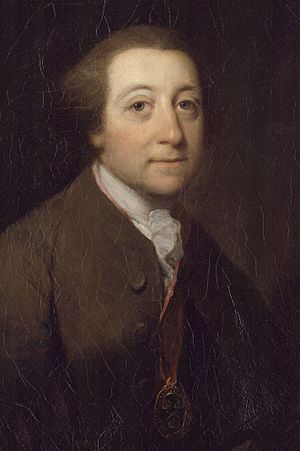William Whitehead (poet) facts for kids
Quick facts for kids
William Whitehead
|
|
|---|---|

A portrait of Whitehead by artist Benjamin Wilson.
|
|
| Poet Laureate of the United Kingdom | |
| In office 19 December 1757 – 14 April 1785 |
|
| Monarch | George II |
| Preceded by | Colley Cibber |
| Succeeded by | Thomas Warton |
| Personal details | |
| Born | baptized 12 February 1715 Cambridge, England |
| Died | 14 April 1785 (aged 70) Berkeley Square, London |
| Resting place | Grosvenor Chapel |
| Education | Winchester College (1735) Clare College, Cambridge BA (1739); MA (1743) |
| Occupation | Poet, Playwright |
William Whitehead (born in 1715, died in 1785) was an English poet and playwright. He became the official Poet Laureate for Britain in 1757. This important job meant he wrote poems for the King and the country. He took on this role after another famous poet, Thomas Gray, turned it down.
Contents
About William Whitehead
Early Life and Education
William Whitehead was born in Cambridge, England. His father was a baker. A kind person named Henry Bromley helped William get into Winchester College when he was fourteen.
In 1735, he went to Clare College, Cambridge on a special scholarship. He became a "fellow" there in 1742, which meant he was a senior member of the college. He earned his Master of Arts degree in 1743. While at Cambridge, William started writing and publishing poems. Some of his early works included "On the Danger of writing Verse" and "Ann Boleyn to Henry the Eighth."
Life in London and Travel
In 1745, William Whitehead became a tutor for George Villiers, who was the son of an important Earl. William then moved to London. There, he wrote two plays called The Roman Father and Creusa, Queen of Athens. These plays were based on older Greek and Roman stories.
From 1754 to 1756, William traveled around Europe. He went on what was called a "Grand Tour" with his students, Lord Villiers and George Harcourt. A Grand Tour was a long trip that young, wealthy men took to learn about European art and culture.
Becoming Poet Laureate
After Thomas Gray said no to the job, William Whitehead was chosen as the new Poet Laureate. He was a good choice because he had been a tutor for George Harcourt. George Harcourt's father was the Governor to the Prince of Wales, who later became King George III. This connection made William well-liked by the royal court.
William also held another important position. He was appointed as the Register and Secretary for the Knights of the Most Honourable Order of the Bath. He passed away in London on April 14, 1785, and was buried in South Audley Street Chapel.
His Writings
Popular Plays
Many of William Whitehead's works were very popular. His play The Roman Father was a big success in 1750. It was put on by the famous actor David Garrick. His play Creusa, Queen of Athens (1754) also received good reviews. Two of his comedies, The School for Lovers (1762) and The Trip to Scotland (1770), were also successful.
The Poet Laureate's Role
After becoming Poet Laureate, William Whitehead wrote a funny poem. It was called "A Pathetic Apology for All Laureates, Past, Present, And To Come." In this poem, he defended the work of Poets Laureate. He took his job seriously and tried to represent the whole country.
He believed he didn't need to always support the King or the government. This shows that the Poet Laureate's job had changed. Their official poems were not expected to change people's minds as much anymore. This was true even during important times, like when the American colonies were rebelling.
For about 28 years, William wrote the poems he was required to. He avoided flattering the King too much or getting involved in politics. Instead, he focused on Britain's place in the world. He was one of the first Laureates to talk about the "spirit of England" rather than just court or party issues. However, some of the official poems (called odes) he wrote were made fun of. A writer named Charles Churchill even criticized him in a poem in 1762.
William Whitehead's poems were collected into two books in 1774. A third book, which included a story about his life, came out after he died in 1788. His plays can be found in old theater collections. His poems are also in large collections of English poetry.
A Poem by William Whitehead
|
|
And Cælia has undone me;
The pleasing plague stole on me.
For there no graces revel;
Have rather been uncivil.
There's nothing more than common;
Like any other woman.
'Twas both perhaps, or neither;
Of Cælia altogether. |
|
 | Aurelia Browder |
 | Nannie Helen Burroughs |
 | Michelle Alexander |

